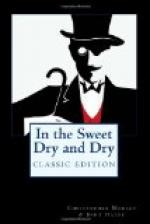“The horse!” cried Quimbleton, with fierce energy. “The Bishop’s horse—in the stable!”
They ran wildly to the rear quarters of the Home, where they found the Bishop’s famous charger whinneying in his stall. All three leaped upon his back. In the confusion, amid the screams of the tortured inmates and the cruel cries of the invading chuffs, they made good their escape.
Every one of the wretched inmates captured at the psychic carouse was immediately sentenced to six months’ hard listening on the Chautauqua circuit. But even during this brutal punishment their memories returned with tenderest reminiscence to the experience of that afternoon. As one of them said, “it was a real treat.” And although Quimbleton had plainly stated the relation in which he stood to Theodolinda Chuff, she had no less than two hundred and ten proposals of marriage, by mail, from those who had attended the seance.
CHAPTER VII
THE DECANTERBURY PILGRIMS
Through a dreary waste of devastated country a little group of refugees plodded in silence. All about them lay fields and orchards which had been torn and uprooted as though by some unbelievable whirlwind. At a watering trough along the road they halted, facing the sign:
Compulsory drinking station
Adults, 1 quart
Children, 1 pint
Thirst forbidden between here and the next station
Under the eye of an armed chuff, who watched them suspiciously, the wretched wanderers drank the water in silence, but without enthusiasm. Then they shuffled on down the road.
At the front of the small procession a slender girl, in a much-stained sports suit, rode on a tall black horse. Beside the horse trudged a bulky man in a grotesque garb of dirty lavender quilting. A matted whisk of coarse beard drooped from his chin, but his blue eyes burned brightly in his sunburnt face. Over his shoulder he carried a six foot length of brass railing, a small folding table, and a shabby knapsack.
Behind the horse limped a lean, dyspeptic-colored individual in a Palm Beach suit that would have been a social death-warrant on the shining sands of its name-place. There is no form of sartorialism that takes on such utter humility as a Palm Beach suit gone wrong. This particular vestment was spotted with ink, with mud, with fruit-juices, with every kind of stain; it was punctured with perforations that might have been due to fallen tobacco tinder. The individual within this travesty of clothing was painfully propelling a wheelbarrow, in which rode (not without complaint) a substantial woman and a baby. An older child trailed from the Palm Beach coat-tail.
These jovial vagabonds, as the reader will have suspected, were no other than Theodolinda Chuff, Virgil Quimbleton, and the family of Bleaks.




